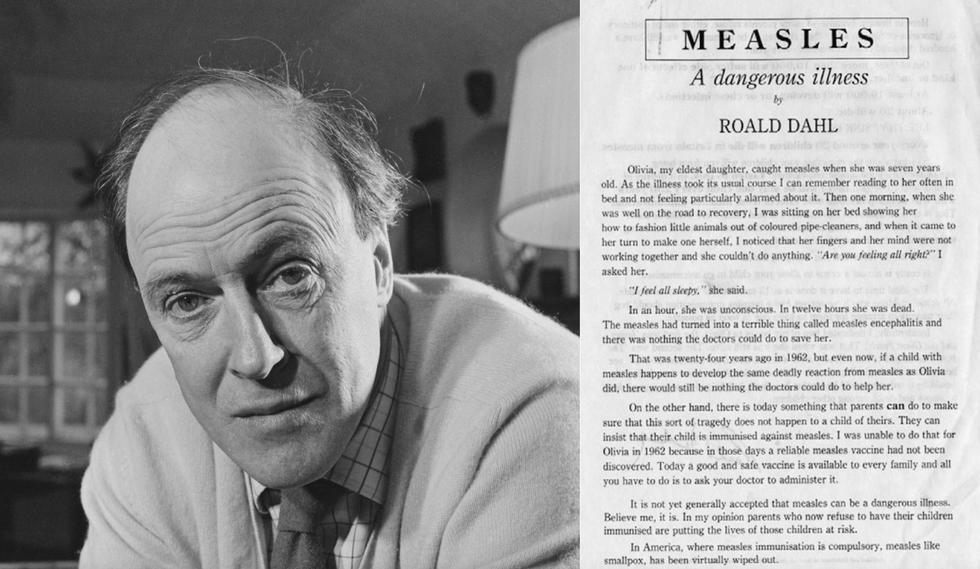Roald Dahl lost a child to measles. Here's what he has to say about the new outbreaks.

Olivia Dahl, shortly before her death from measles in 1962.
In 1962, the world was a remarkably different place: Neil Armstrong had yet to take his first steps on the lunar surface, John F. Kennedy was serving as president of the United States, and the Beatles were still a few years away from superstardom, having just recorded their first single.
The word “measles” was also a household name. Measles, which still exists in parts of the world today, is a highly contagious viral infection that typically causes fever, cough, muscle pain, fatigue, and a distinctive red rash. Measles was so pervasive around the world in 1962 that most children had gotten sick with it before the age of fifteen—but even though it was common, it was far from harmless. Measles killed around 400 to 500 people per year in the United States, and approximately 2.6 million people each year worldwide. Countless others suffered severe complications from measles, such as permanent blindness.
Tragedy hits home

Author Roald Dahl at his Buckinghamshire home with Olivia, daughter Chantal, and wife Patricia Neal in 1960.
Ben Martin / Getty Images
That year, British author Roald Dahl was beginning to make a name for himself, having just published his best-selling book James and the Giant Peach. Dahl, who would go on to write some of the most well-loved children’s books of the century, lived in southern England with his wife and three children. One day, Dahl and his wife, actress Patricia Neal, received word that there was an outbreak of measles at his daughters’ school.
While some parents quarantined their children, many others also considered measles a harmless childhood disease. Neal later recalled in her autobiography that a family member had advised her to “let the girls get measles,” thinking it would strengthen their immune systems and be “good for them.” Reluctantly, Dahl and Neal let their two school-aged children, Olivia and Chantal, continue school. Olivia, then aged seven, fell sick with the measles not long after that.
Neither Dahl nor Neal were terribly concerned about Olivia’s infection. Dahl would write later that it seemed to be taking its “usual course,” and the two would read and spend time together while Olivia rested. After a few days of fever and fatigue, Dahl wrote, Olivia seemed like she was “well on the road to recovery.”
But one afternoon, as the two sat on Olivia’s bed making animals out of pipe cleaners, Dahl noticed that Olivia’s “fingers and her mind were not working together.” When Dahl asked how she was feeling, Olivia replied, “I feel all sleepy.”
Within an hour, Dahl wrote, Olivia was unconscious. Within 12 hours, she was dead.
Olivia died of measles encephalitis, an inflammation of the brain caused by an infection. Approximately 1 in 1,000 people infected with measles develop encephalitis, and of those who develop it, between 10 and 20 percent will die.
Dahl was overcome with grief and wracked with guilt for being unable to prevent his daughter’s death. Mourning, Dahl threw himself into his writing and, in his spare time, spent hours lovingly constructing a rock garden on Olivia’s grave in a local churchyard.
After Olivia’s death, Dahl wrote sixteen novels and several collections of short stories, including Matilda, Fantastic Mr. Fox, and Willy Wonka and the Chocolate Factory, which garnered him worldwide acclaim. His most influential piece of writing, however, wasn’t written until 1986.
A father's plea

Roald Dahl and the open letter he wrote in 1986, encouraging parents to vaccinate their children against measles.
By 1986, measles was no longer the global health threat that it had been in the 1960s, thanks to a measles vaccine that became available just one year after Olivia had died. Still, in the United Kingdom alone, approximately 80,000 people every year were infected with measles. This bothered Dahl, especially since measles rates in the United States had dropped by 98 percent compared to pre-vaccine years. “Why do we have so much measles in Britain when the Americans have virtually gotten rid of it?,” Dahl was reported to have said.
So Dahl set out to prevent a tragedy like Olivia’s from happening again. With encouragement from several prominent public health activists, Dahl wrote an open letter addressed to parents in the UK. The letter recounted his daughter’s death from encephalitis and begged parents to protect their own children from measles:
“...there is today something that parents can do to make sure that this sort of tragedy does not happen to a child of theirs. They can insist that their child is immunised [sic] against measles. I was unable to do that for Olivia in 1962 because in those days a reliable measles vaccine had not been discovered. Today a good and safe vaccine is available to every family and all you have to do is to ask your doctor to administer it.”
Dahl went on to say that although many parents still viewed measles as a harmless illness, he knew from experience that it was not. Measles was capable of causing disability and death, Dahl wrote, whereas a child had a better chance of “choking on a chocolate bar” than developing any serious complication from the vaccine. Dahl ended his letter by saying how happy he knew Olivia would be “if only she could know that her death had helped to save a good deal of illness and death among other children.”
Dahl’s letter was published in early 1986 and distributed to local healthcare workers, schools, and to parents of children who were particularly at risk. As the letter circulated, vaccination rates continued to climb year after year.
Thirty-one years after Dahl’s letter was published, and 55 years after Olivia’s death, the World Health Organization declared in 2017 that measles had officially been eradicated for the first time in the UK thanks to high rates of vaccination.
A small step back

As vaccination rates decline, measles is now making a strong comeback in the United States and elsewhere.
Getty Images
Today, vaccination rates for the measles are in decline, and countries like the UK and the US, who had once eradicated measles completely, are now seeing a comeback. The Centers for Disease Control and Prevention (CDC) recently reported that between December 1, 2023 and January 23, 2024, 23 cases of measles had been confirmed across multiple states. The majority of these cases, they reported, were among children and adolescents who had traveled internationally and had not yet been vaccinated even though they were eligible to do so.
Roald Dahl passed away in 1990, but fortunately, his writing continues to live on. While readers can explore fantastical worlds through his novels and short stories, they can also look back to a reality when tragic deaths like Olivia’s happened far too often. The difference is that today, thanks to modern science, we now have the tools to stop them.
After his grandmother’s dementia diagnosis, one man invented a snack to keep her healthy and hydrated.
Founder Lewis Hornby and his grandmother Pat, sampling Jelly Drops—an edible gummy containing water and life-saving electrolytes.
On a visit to his grandmother’s nursing home in 2016, college student Lewis Hornby made a shocking discovery: Dehydration is a common (and dangerous) problem among seniors—especially those that are diagnosed with dementia.
Hornby’s grandmother, Pat, had always had difficulty keeping up her water intake as she got older, a common issue with seniors. As we age, our body composition changes, and we naturally hold less water than younger adults or children, so it’s easier to become dehydrated quickly if those fluids aren’t replenished. What’s more, our thirst signals diminish naturally as we age as well—meaning our body is not as good as it once was in letting us know that we need to rehydrate. This often creates a perfect storm that commonly leads to dehydration. In Pat’s case, her dehydration was so severe she nearly died.
When Lewis Hornby visited his grandmother at her nursing home afterward, he learned that dehydration especially affects people with dementia, as they often don’t feel thirst cues at all, or may not recognize how to use cups correctly. But while dementia patients often don’t remember to drink water, it seemed to Hornby that they had less problem remembering to eat, particularly candy.

Hornby wanted to create a solution for elderly people who struggled keeping their fluid intake up. He spent the next eighteen months researching and designing a solution and securing funding for his project. In 2019, Hornby won a sizable grant from the Alzheimer’s Society, a UK-based care and research charity for people with dementia and their caregivers. Together, through the charity’s Accelerator Program, they created a bite-sized, sugar-free, edible jelly drop that looked and tasted like candy. The candy, called Jelly Drops, contained 95% water and electrolytes—important minerals that are often lost during dehydration. The final product launched in 2020—and was an immediate success. The drops were able to provide extra hydration to the elderly, as well as help keep dementia patients safe, since dehydration commonly leads to confusion, hospitalization, and sometimes even death.
Not only did Jelly Drops quickly become a favorite snack among dementia patients in the UK, but they were able to provide an additional boost of hydration to hospital workers during the pandemic. In NHS coronavirus hospital wards, patients infected with the virus were regularly given Jelly Drops to keep their fluid levels normal—and staff members snacked on them as well, since long shifts and personal protective equipment (PPE) they were required to wear often left them feeling parched.
In April 2022, Jelly Drops launched in the United States. The company continues to donate 1% of its profits to help fund Alzheimer’s research.
Theupcoming vaccine is changing the way we look at treating one of the country’s deadliest cancers.
Last week, researchers at the University of Oxford announced that they have received funding to create a brand new way of preventing ovarian cancer: A vaccine. The vaccine, known as OvarianVax, will teach the immune system to recognize and destroy mutated cells—one of the earliest indicators of ovarian cancer.
Understanding Ovarian Cancer
Despite advancements in medical research and treatment protocols over the last few decades, ovarian cancer still poses a significant threat to women’s health. In the United States alone, more than 12,0000 women die of ovarian cancer each year, and only about half of women diagnosed with ovarian cancer survive five or more years past diagnosis. Unlike cervical cancer, there is no routine screening for ovarian cancer, so it often goes undetected until it has reached advanced stages. Additionally, the primary symptoms of ovarian cancer—frequent urination, bloating, loss of appetite, and abdominal pain—can often be mistaken for other non-cancerous conditions, delaying treatment.
An American woman has roughly a one percent chance of developing ovarian cancer throughout her lifetime. However, these odds increase significantly if she has inherited mutations in the BRCA1 or BRCA2 genes. Women who carry these mutations face a 46% lifetime risk for ovarian and breast cancers.
An Unlikely Solution
To address this escalating health concern, the organization Cancer Research UK has invested £600,000 over the next three years in research aimed at creating a vaccine, which would destroy cancerous cells before they have a chance to develop any further.
Researchers at the University of Oxford are at the forefront of this initiative. With funding from Cancer Research UK, scientists will use tissue samples from the ovaries and fallopian tubes of patients currently battling ovarian cancer. Using these samples, University of Oxford scientists will create a vaccine to recognize certain proteins on the surface of ovarian cancer cells known as tumor-associated antigens. The vaccine will then train that person’s immune system to recognize the cancer markers and destroy them.
The next step
Once developed, the vaccine will first be tested in patients with the disease, to see if their ovarian tumors will shrink or disappear. Then, the vaccine will be tested in women with the BRCA1 or BRCA2 mutations as well as women in the general population without genetic mutations, to see whether the vaccine can prevent the cancer altogether.
While the vaccine still has “a long way to go,” according to Professor Ahmed Ahmed, Director of Oxford University’s ovarian cancer cell laboratory, he is “optimistic” about the results.
“We need better strategies to prevent ovarian cancer,” said Ahmed in a press release from the University of Oxford. “Currently, women with BRCA1/2 mutations are offered surgery which prevents cancer but robs them of the chance to have children afterward.
Teaching the immune system to recognize the very early signs of cancer is a tough challenge. But we now have highly sophisticated tools which give us real insights into how the immune system recognizes ovarian cancer. OvarianVax could offer the solution.”

